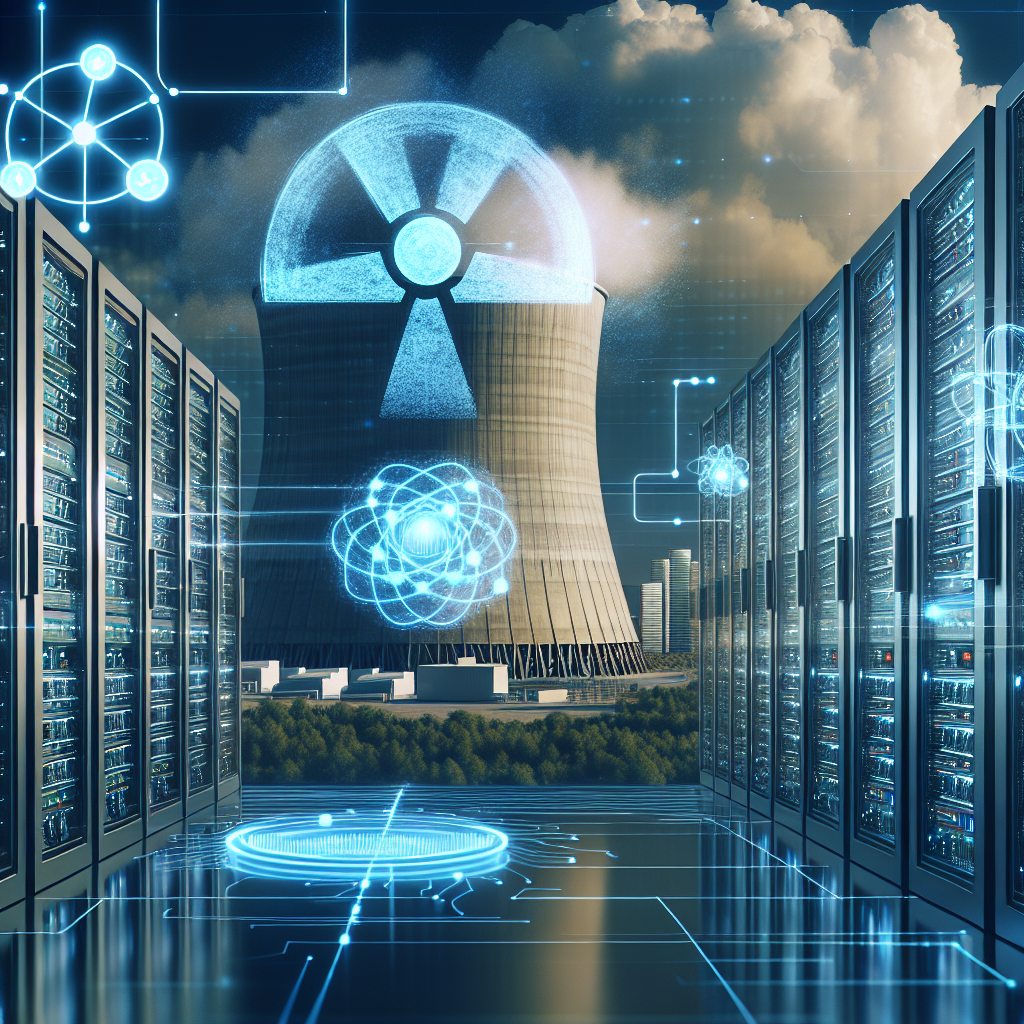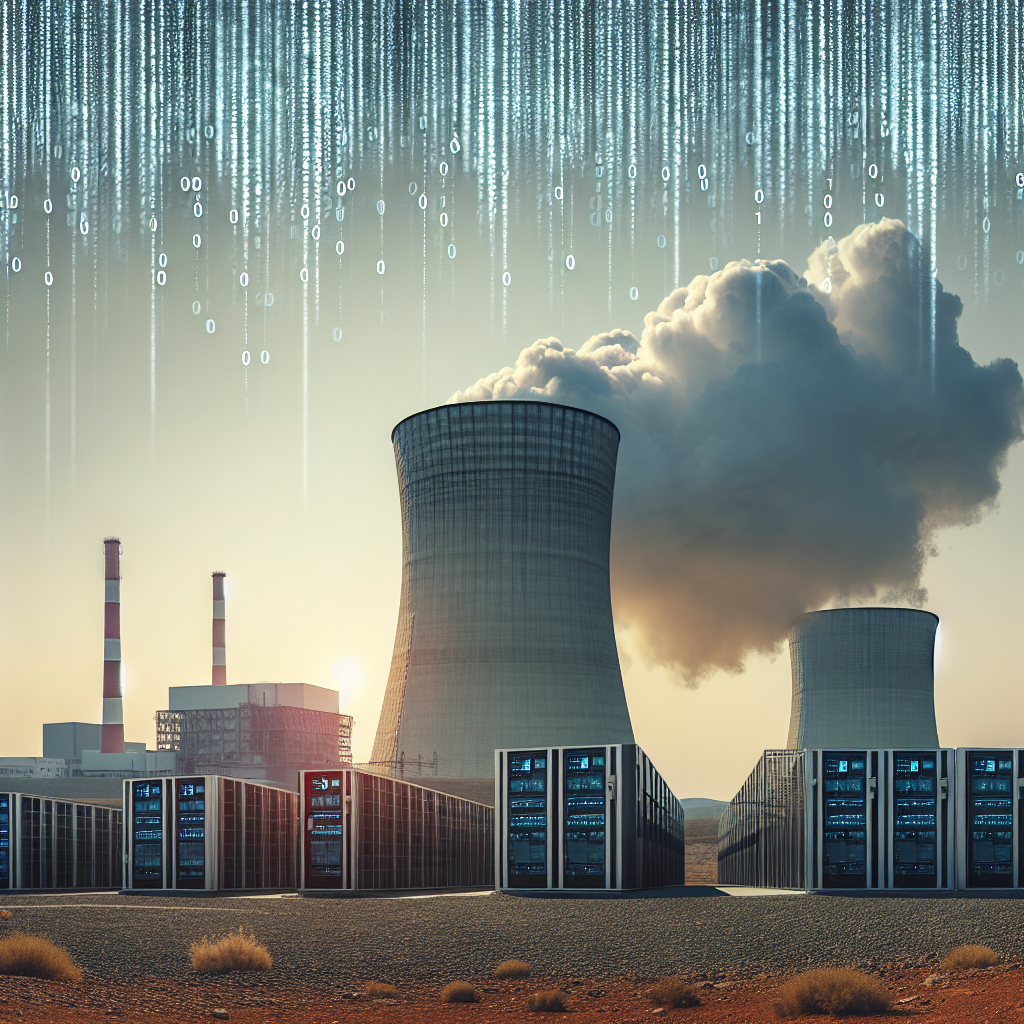-
Table of Contents
- Rising Concerns as Data Centers Turn to Nuclear Power for AI Demands
- The Growing Energy Demands of AI
- Nuclear Power: A Potential Solution
- Environmental Concerns
- Security Risks
- Economic Considerations
- Case Studies
- Microsoft and Oklo
- Google’s Carbon-Free Commitment
- Public Perception and Acceptance
- Future Prospects
- Conclusion
Rising Concerns as Data Centers Turn to Nuclear Power for AI Demands

As the world becomes increasingly digital, the demand for data processing and storage has skyrocketed. Data centers, the backbone of our digital infrastructure, are under immense pressure to meet the growing needs of artificial intelligence (AI) and other data-intensive applications. To address these demands, some data centers are turning to nuclear power as a potential solution. However, this shift has sparked a range of concerns, from environmental impacts to security risks. This article delves into the rising concerns as data centers turn to nuclear power for AI demands, providing a comprehensive overview of the issue.
The Growing Energy Demands of AI
Artificial intelligence has revolutionized various industries, from healthcare to finance, by enabling advanced data analytics, machine learning, and automation. However, the computational power required to run AI algorithms is immense. According to a study by OpenAI, the computational resources used in the largest AI training runs have been doubling approximately every 3.4 months since 2012. This exponential growth in computational demand translates to a significant increase in energy consumption.
Data centers, which house the servers and infrastructure needed to process and store data, are already major energy consumers. The International Energy Agency (IEA) estimates that data centers accounted for about 1% of global electricity use in 2020. With the rise of AI, this figure is expected to grow substantially, putting additional strain on the energy grid and prompting data centers to seek alternative energy sources.
Nuclear Power: A Potential Solution
Nuclear power is being considered as a viable option to meet the energy demands of data centers. Unlike fossil fuels, nuclear power generates electricity with minimal greenhouse gas emissions, making it an attractive option for reducing the carbon footprint of data centers. Additionally, nuclear power plants can provide a stable and reliable source of energy, which is crucial for the continuous operation of data centers.
Several companies and organizations are exploring the use of nuclear power for data centers. For example:
- Microsoft: In 2020, Microsoft announced a partnership with the nuclear energy startup Oklo to explore the use of advanced nuclear reactors for powering its data centers.
- Google: Google has also expressed interest in nuclear power as part of its commitment to becoming carbon-free by 2030. The company is investigating the potential of small modular reactors (SMRs) to provide clean energy for its data centers.
- Data Center Operators: Several data center operators are in discussions with nuclear energy providers to explore the feasibility of using nuclear power for their facilities.
Environmental Concerns
While nuclear power offers a low-carbon alternative to fossil fuels, it is not without its environmental concerns. The primary issues include:
- Nuclear Waste: The disposal of nuclear waste remains a significant challenge. Spent nuclear fuel is highly radioactive and requires secure storage for thousands of years. The long-term management of nuclear waste poses environmental and safety risks.
- Accident Risks: Although modern nuclear reactors are designed with advanced safety features, the risk of accidents cannot be entirely eliminated. Incidents like the Fukushima disaster in 2011 highlight the potential consequences of nuclear accidents.
- Water Usage: Nuclear power plants require large amounts of water for cooling. This can strain local water resources, particularly in regions facing water scarcity.
Security Risks
The use of nuclear power for data centers also raises security concerns. These include:
- Cybersecurity Threats: Data centers are prime targets for cyberattacks due to the sensitive information they store. Integrating nuclear power adds another layer of complexity, as nuclear facilities are also vulnerable to cyber threats. Ensuring the cybersecurity of both data centers and nuclear power plants is crucial.
- Physical Security: Nuclear power plants are potential targets for physical attacks, including terrorism. The proximity of data centers to nuclear facilities could increase the risk of such attacks, necessitating enhanced security measures.
- Regulatory Compliance: The use of nuclear power involves strict regulatory requirements. Data center operators must navigate complex regulations to ensure compliance, which can be time-consuming and costly.
Economic Considerations
The economic implications of using nuclear power for data centers are multifaceted. On one hand, nuclear power can provide a stable and potentially cost-effective source of energy. On the other hand, the initial investment and ongoing operational costs can be substantial. Key economic considerations include:
- Capital Costs: Building nuclear power plants requires significant capital investment. The construction of advanced reactors and small modular reactors (SMRs) can be particularly expensive.
- Operational Costs: Operating and maintaining nuclear power plants involves high costs, including fuel, labor, and regulatory compliance. These costs must be factored into the overall economic viability of using nuclear power for data centers.
- Energy Pricing: The cost of nuclear-generated electricity can vary based on factors such as fuel prices, regulatory changes, and market conditions. Data center operators must assess the long-term pricing stability of nuclear power.
Case Studies
To better understand the potential and challenges of using nuclear power for data centers, let’s examine a few case studies:
Microsoft and Oklo
In 2020, Microsoft announced a partnership with Oklo, a nuclear energy startup, to explore the use of advanced nuclear reactors for powering its data centers. Oklo’s microreactors are designed to be small, modular, and efficient, making them suitable for data center applications. The partnership aims to demonstrate the feasibility of using microreactors to provide clean and reliable energy for Microsoft’s data centers.
While the project is still in its early stages, it highlights the potential of advanced nuclear technologies to address the energy demands of data centers. However, it also underscores the need for rigorous safety and regulatory measures to ensure the safe deployment of nuclear power.
Google’s Carbon-Free Commitment
Google has set an ambitious goal to operate on carbon-free energy 24/7 by 2030. As part of this commitment, the company is exploring various clean energy sources, including nuclear power. Google is particularly interested in small modular reactors (SMRs), which offer the potential for scalable and flexible deployment.
Google’s exploration of nuclear power is driven by the need to meet its energy demands while minimizing its carbon footprint. However, the company faces challenges related to regulatory compliance, public perception, and the economic viability of SMRs.
Public Perception and Acceptance
The use of nuclear power for data centers also hinges on public perception and acceptance. Nuclear power has long been a contentious issue, with strong opinions on both sides. Key factors influencing public perception include:
- Safety Concerns: Public concerns about the safety of nuclear power, particularly in the wake of high-profile accidents, can influence acceptance. Transparent communication and robust safety measures are essential to address these concerns.
- Environmental Impact: The environmental benefits of nuclear power, such as reduced greenhouse gas emissions, must be effectively communicated to gain public support. Addressing concerns about nuclear waste and water usage is also crucial.
- Trust in Technology: Public trust in advanced nuclear technologies, such as microreactors and SMRs, will play a significant role in acceptance. Demonstrating the reliability and safety of these technologies is key to building trust.
Future Prospects
The future of using nuclear power for data centers is uncertain but promising. Advances in nuclear technology, such as the development of microreactors and SMRs, offer the potential for safer, more efficient, and scalable deployment. Additionally, ongoing research and innovation in nuclear energy could address some of the environmental and security concerns associated with traditional nuclear power.
However, several challenges must be overcome to realize the full potential of nuclear-powered data centers. These include:
- Regulatory Hurdles: Navigating the complex regulatory landscape for nuclear power is a significant challenge. Streamlining regulatory processes and ensuring compliance will be essential for the successful deployment of nuclear-powered data centers.
- Public Acceptance: Building public trust and acceptance of nuclear power is crucial. Transparent communication, robust safety measures, and addressing environmental concerns will be key to gaining public support.
- Economic Viability: Ensuring the economic viability of nuclear power for data centers requires careful consideration of capital and operational costs, as well as long-term energy pricing stability.
Conclusion
The rising energy demands of AI and data-intensive applications are driving data centers to explore alternative energy sources, including nuclear power. While nuclear power offers the potential for a stable and low-carbon energy supply, it also raises a range of environmental, security, and economic concerns. Case studies such as Microsoft’s partnership with Oklo and Google’s exploration of SMRs highlight both the potential and challenges of using nuclear power for data centers.
Addressing these concerns requires a multifaceted approach, including advances in nuclear technology, robust safety and regulatory measures, transparent communication, and public engagement. As the digital landscape continues to evolve, the future of nuclear-powered data centers will depend on our ability to navigate these challenges and harness the potential of nuclear energy to meet the growing demands of AI and beyond.








